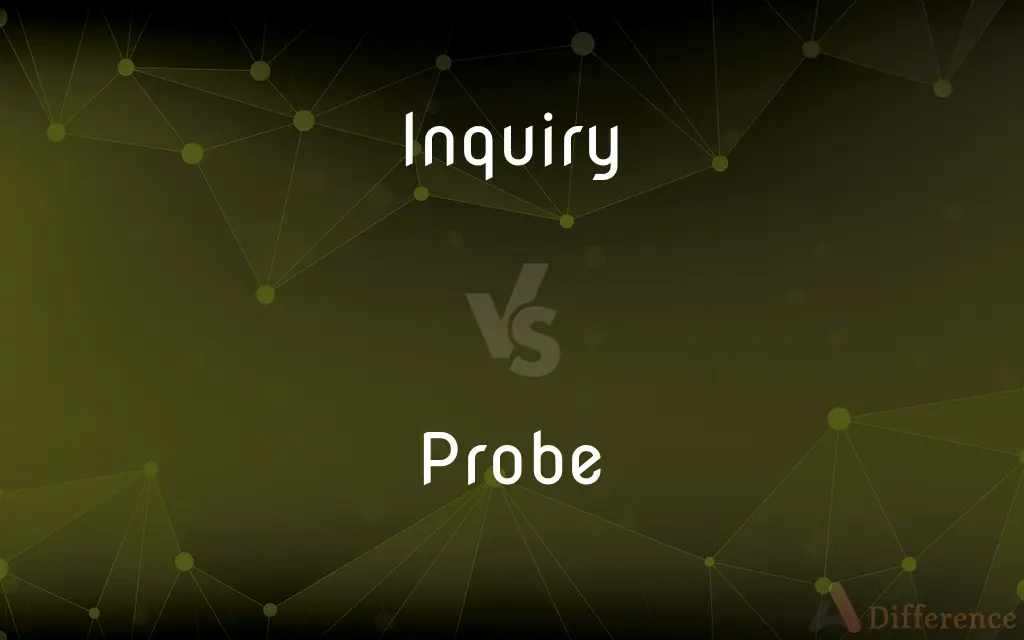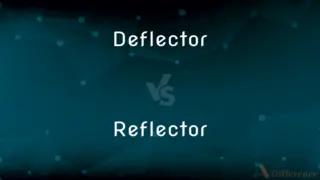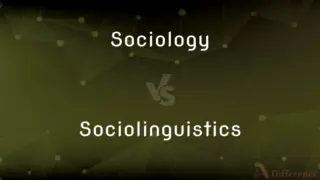Inquiry vs. Probe — What's the Difference?
By Tayyaba Rehman & Maham Liaqat — Updated on March 15, 2024
Inquiry is a general request for information, while probe is a detailed investigation.

Difference Between Inquiry and Probe
Table of Contents
ADVERTISEMENT
Key Differences
Inquiry refers to the act of asking for information or conducting a general investigation into a subject or issue. It often implies a formal or systematic process of questioning or examination. Whereas, a probe is more specific and involves a thorough investigation into a particular matter, often with the intention of uncovering hidden details or truths. Inquiries can be broad, covering various aspects of a topic, while probes are typically focused and in-depth, aiming to delve into the specifics of an issue.
An inquiry might be initiated to gather general information or understand a concept, using methods such as surveys, questionnaires, or casual questioning. On the other hand, a probe is usually more structured and involves detailed scrutiny, such as in scientific research or criminal investigations, where specific evidence or data is sought. Inquiries serve to clarify doubts or gain knowledge, while probes aim to investigate deeply, often prompted by a suspicion or a need to solve a problem.
Inquiries can be informal and part of everyday interactions, such as asking about someone’s well-being or seeking clarification on a lecture topic. Probes, however, are typically formal and systematic, requiring specific methodologies and often conducted by professionals or experts in the field. For example, a journalist might make an inquiry about a public figure’s opinion on a matter, whereas a probe might involve investigating the figure’s involvement in a controversy.
While inquiries may lead to broad understanding or general knowledge, probes are designed to produce concrete outcomes, such as solutions, discoveries, or resolutions to issues. An inquiry might result in a compilation of opinions or a summary of existing knowledge, whereas a probe could uncover new facts, lead to the development of new theories, or result in actionable insights.
In the context of communication, inquiries allow for an open exchange of information and are often the starting point for learning or discussion. Probes, by contrast, are more investigative and may require digging beneath the surface, often involving critical thinking and analysis to interpret the findings. While inquiries open the door to knowledge, probes delve into the specifics, requiring a more focused and determined approach to uncovering the truth.
ADVERTISEMENT
Comparison Chart
Definition
Asking for information
Detailed investigation
Scope
Broad, general
Focused, in-depth
Formality
Can be informal or formal
Typically formal and systematic
Purpose
To gather information or understand
To uncover details or truths
Outcome
Broad understanding
Concrete outcomes or discoveries
Compare with Definitions
Inquiry
General questioning.
The student's inquiry about the course requirements was answered promptly by the advisor.
Probe
Detailed investigation.
The detective's probe into the case revealed unexpected evidence.
Inquiry
Request for information.
Their inquiry into the availability of the hall for the event was met with several options.
Probe
Critical inquiry.
Her probe into the historical records unearthed new insights about the era.
Inquiry
Seeking clarification.
They made an inquiry about the terms of the contract to avoid misunderstandings.
Probe
In-depth examination.
The probe into the company’s finances exposed significant discrepancies.
Inquiry
Casual questioning.
His inquiry about her health was met with a positive response.
Probe
Scientific research.
The research team's probe into the causes of the disease led to breakthrough findings.
Inquiry
Exploratory investigation.
The committee conducted an inquiry into the effectiveness of the new policy.
Probe
Investigative questioning.
The journalist's probe into the politician's career raised several important questions.
Inquiry
An inquiry (also spelled as enquiry in British English) is any process that has the aim of augmenting knowledge, resolving doubt, or solving a problem. A theory of inquiry is an account of the various types of inquiry and a treatment of the ways that each type of inquiry achieves its aim.
Probe
A blunt-ended surgical instrument used for exploring a wound or part of the body.
Inquiry
The act of inquiring
Engaged in scientific inquiry.
Probe
A thorough investigation into a crime or other matter
A probe into city hall corruption
Inquiry
A question; a query
There were many inquiries about the new tax rates.
Probe
An unmanned exploratory spacecraft designed to transmit information about its environment.
Inquiry
A close examination of a matter
A Congressional inquiry into the scandal.
Probe
A projecting device for engaging in a drogue, either on an aircraft for use in in-flight refuelling or on a spacecraft for use in docking with another craft.
Inquiry
The act of inquiring; a seeking of information by asking questions; interrogation; a question or questioning.
Probe
Physically explore or examine (something) with the hands or an instrument
Hands probed his body from top to bottom
Inquiry
Search for truth, information, or knowledge; examination of facts or principles; research; investigation
Scientific inquiry
Probe
A slender, flexible surgical instrument used to explore a wound or body cavity.
Inquiry
The act of inquiring; a seeking for information by asking questions; interrogation; a question or questioning.
He could no path nor track of foot descry,Nor by inquiry learn, nor guess by aim.
The men which were sent from Cornelius had made inquiry for Simon's house, and stood before the gate.
Probe
An electrode or other device that can be placed inside something to take and convey measurements.
Inquiry
Search for truth, information, or knowledge; examination into facts or principles; research; investigation; as, physical inquiries.
All that is wanting to the perfection of this art will undoubtedly be found, if able men . . . will make inquiry into it.
Probe
A substance, such as DNA, that is radioactively labeled or otherwise marked and used to detect or identify another substance in a sample.
Inquiry
A search for knowledge;
Their pottery deserves more research than it has received
Probe
A space probe.
Inquiry
An instance of questioning;
There was a question about my training
We made inquiries of all those who were present
Probe
An exploratory action or expedition, especially one designed to investigate and obtain information on a remote or unknown region
The scouts' probe of enemy territory.
Inquiry
A systematic investigation of a matter of public interest
Probe
The act of exploring or searching with a device or instrument
The surgeon's probe of the clogged artery.
Probe
An investigation into unfamiliar matters or questionable activities; a penetrating inquiry
A congressional probe into price fixing.
A reporter's probe into a public figure's past.
Probe
To penetrate or explore physically, especially with a probe, in order to find or discover something
"Chimpanzees use a variety of tools to probe termite mounds" (Virginia Morell).
Probe
To investigate by means of a chemical probe.
Probe
To make an inquiry about (something); investigate or examine
Probed the impact of technology on social behavior.
Probe
To subject (a person) to questioning; interrogate.
Probe
To make a physical search, especially by penetrating with a probe
Birds probing in the sand for clams.
Probe
To pose questions or conduct an investigation
The police are probing into what really happened.
Probe
(surgery) Any of various medical instruments used to explore wounds, organs, etc.
Probe
(figuratively) Something which penetrates something else, as though to explore; something which obtains information.
Probe
An act of probing; a prod, a poke.
Probe
(figuratively) An investigation or inquiry.
They launched a probe into the cause of the accident.
Probe
(aeronautics) A tube attached to an aircraft which can be fitted into the drogue from a tanker aircraft to allow for aerial refuelling.
Probe
(sciences) A small device, especially an electrode, used to explore, investigate or measure something by penetrating or being placed in it.
Insert the probe into the soil and read the temperature.
Probe
(astronautics) A small, usually unmanned, spacecraft used to acquire information or measurements about its surroundings.
Probe
(game of go) a move with multiple answers seeking to make the opponent choose and commit to a strategy
Probe
(biochemistry) Any group of atoms or molecules radioactively labeled in order to study a given molecule or other structure
Probe
(ambitransitive) To explore, investigate, or question
If you probe further, you may discover different reasons.
Probe
(transitive) To insert a probe into.
Probe
To examine, as a wound, an ulcer, or some cavity of the body, with a probe.
Probe
Fig.: to search to the bottom; to scrutinize or examine thoroughly.
The growing disposition to probe the legality of all acts, of the crown.
Probe
An instrument for examining the depth or other circumstances of a wound, ulcer, or cavity, or the direction of a sinus, of for exploring for bullets, for stones in the bladder, etc.
Probe
An inquiry into unfamiliar or questionable activities;
There was a congressional probe into the scandal
Probe
A flexible slender surgical instrument used to explore wounds or body cavities
Probe
An exploratory action or expedition
Probe
An investigation conducted using a probe instrument
Probe
Question or examine thoroughly and closely
Probe
Examine physically with or as if with a probe;
Probe an anthill
Common Curiosities
What is an inquiry?
An inquiry is a request for information or a general investigation into a subject.
What is the purpose of an inquiry?
The purpose of an inquiry is to gather information, clarify doubts, or gain a general understanding of a topic.
What outcomes can an inquiry lead to?
An inquiry can lead to a broad understanding, clarification of doubts, or general knowledge about a subject.
Are inquiries always formal?
Inquiries can be both informal and formal, depending on the context and nature of the information sought.
What methods are used in a probe?
Probes often use systematic and structured methods, such as interviews, document analysis, or scientific experiments.
Can anyone conduct a probe?
While anyone can initiate a probe, effective probes often require expertise and a systematic approach to investigation.
How does a probe differ from an inquiry?
A probe is a detailed and focused investigation aimed at uncovering specific details or truths.
Is a probe always related to negative issues?
Not necessarily; probes can investigate positive developments or explore areas for innovation and improvement.
Can an inquiry lead to a probe?
Yes, an initial inquiry can lead to a probe if the need for a more detailed investigation arises.
What is the purpose of a probe?
The purpose of a probe is to conduct a thorough investigation to uncover hidden details, solve problems, or gather specific evidence.
Can inquiries be conducted online?
Yes, inquiries can be conducted through various online platforms, such as emails, forums, or dedicated inquiry systems.
Do probes always result in public findings?
Not all probes result in public findings; some may be confidential, depending on their nature and the involved parties.
What outcomes can a probe lead to?
A probe can lead to discoveries, solutions to problems, new insights, or concrete evidence.
How important is critical thinking in a probe?
Critical thinking is essential in a probe to analyze information, draw conclusions, and solve complex issues.
How do probes impact decision-making?
Probes can significantly impact decision-making by providing detailed information, uncovering truths, and informing policy or strategy.
Share Your Discovery

Previous Comparison
Deflector vs. Reflector
Next Comparison
Sociology vs. SociolinguisticsAuthor Spotlight
Written by
Tayyaba RehmanTayyaba Rehman is a distinguished writer, currently serving as a primary contributor to askdifference.com. As a researcher in semantics and etymology, Tayyaba's passion for the complexity of languages and their distinctions has found a perfect home on the platform. Tayyaba delves into the intricacies of language, distinguishing between commonly confused words and phrases, thereby providing clarity for readers worldwide.
Co-written by
Maham Liaqat












































